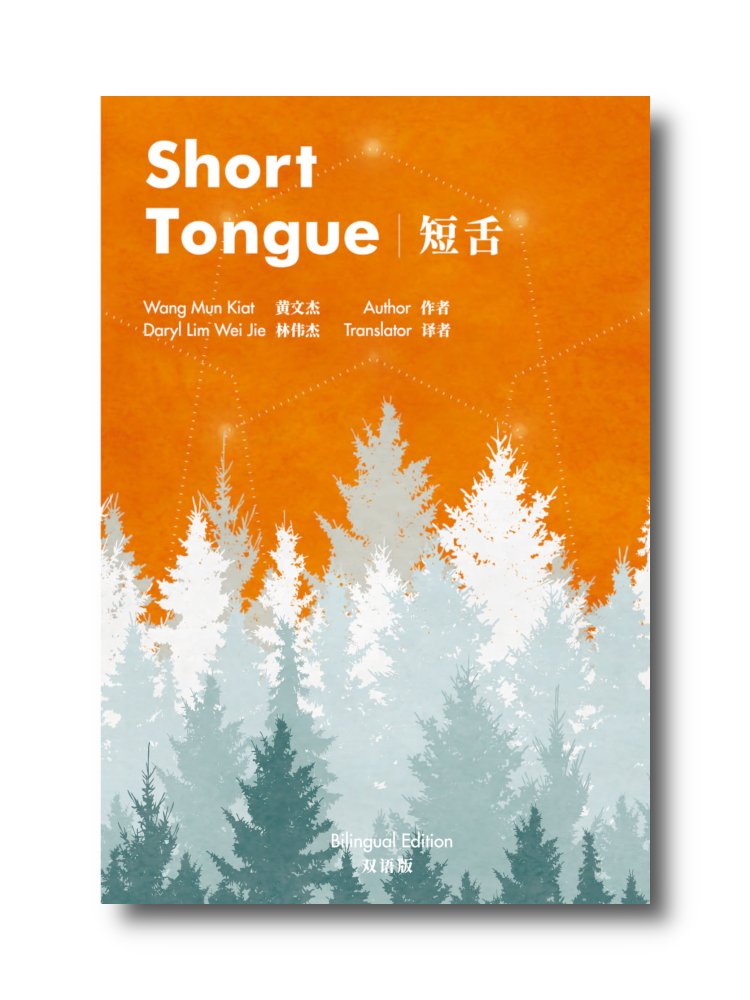+
poems by
Wang Mun Kiat
translated from the Chinese into the English by
Daryl Lim Wei Jie
Paperback, 144 pages.
Rosetta Cultures, Singapore.
+
ABOUT SHORT TONGUE 短舌 (BILINGUAL EDITION) (2023)
BY WANG MUN KIAT
TRANSLATED BY DARYL LIM WEI JIE
Short Tongue is the Singaporean Chinese poet Wang Mun Kiat’s second collection of poetry, representing a distinct change in style from his previous work. The poems in this collection are deceptively short and seemingly simple, but they belie deep reservoirs of irony, wit and social commentary. The title, Short Tongue, hints at an ambiguity and a refusal to define oneself. You can think of each poem as a dagger — that both wounds and tickles. This bilingual edition is published in simplified Chinese and English, in hopes of bringing Wang Mun Kiat’s surprising poetry to a new audience of readers, as well as promoting exchanges between the different language literatures in Singapore.
《短舌》的黄文杰诗风转变之作,以精短凝练的文字,让读者拨云见月。顾名思义,“短舌”可指涉口齿不清、沟通障碍,无以自辩等,因此每首诗形成了它独一无二的逻辑,也变成近距离发射的飞刀——中刀时有点刺痛,却也能令人会心一笑。本次以简体华文与英文(双语对照版)出版,希望给更多的读者惊喜,以及拓展新加坡文学的多元可能与想象。
+
“It is very easy, when translating, to fall into the trap of the overly literal or, in the opposite direction, to become so untethered from the original that it ultimately gets lost. Lim has done an outstanding job of navigating the space between these two temptations, letting his sense of the poetry of the poems guide him to successful translations of them.”
— Shelly Bryant, “Savvy Choices”, QLRS (Oct 2023)
+
“Lim does a commendable job in relaying the authorial intent of Wang Mun Kiat while adding bits of his own interpretations through different word choices and line breaks.”
— Charmaine Lim, “Book review: Short Tongue an accessible bilingual poetry collection, if occasionally oversimplified”, The Straits Times (13 May 2023)
+
“Living up to its title, Short Tongue is a collection of brief yet pointed poems, mixing wry observations of daily life with more trenchant political commentary. Daryl Lim Wei Jie's translations dance fluidly around Wang Mun Kiat's sharp, playful verses; placing both versions side by side allows an unimpeded view of the interplay of poem and translation, of the dialogue between poet and translator. A frisky collection that revels in absurdity and makes mischief with language.”
— Jeremy Tiang, writer and translator
+
“Bilingualism is the art of juggling two worldviews, ripe with pitfalls for misunderstandings and opportunities for serendipitous connection. This book is an excellent exemplar. In between proficient translations, such happenstances illuminate this bilingual edition of Wang Mun Kiat’s Short Tongue. The original poems are aphorisms distilled in modern, largely colloquial Chinese – Wang’s urbane sensibility reflects a clear-eyed perspective on 21st-century living, while still leveraging on the language’s inherent pithiness. Daryl Lim Wei Jie’s English-language translations mirror much of Wang’s revelry in ambivalence, staccato pacing, and particularly its killer wit. Significantly, processing the original and the translation side by side affords fruitful comparison – in a quartet entitled ‘Modern Book of Revelation’, one espies the chasm between Wang’s rhythmic and rhyming schema, and Lim’s valiant attempt to echo it; the moat, if you will. And so you swim leisurely in it, between these two worlds – admiring the satirical Sino-wordplay and then chuckling at the expository Anglo equivalent. What’s shed, what’s gained? You decide.”
— Yeow Kai Chai, author of One to the Dark Tower Comes
+
“Reading Daryl Lim Wei Jie’s translations of Wang Mun Kiat’s poetry can be described in many ways – profound, insightful, challenging (in a good way), and most of all, fun. Lim has found the ideal point to focus on in his work, drawing out the wry humour of the original so that the poetry is allowed to breathe in its new context, just as it does in the original. It is masterful work – precisely the sort of thing I hope to see covering Singapore’s literary landscape. My hope is that more poets in Singapore will take note of what Lim has done in this translation and join him in his engagement with the rich body of SingLit across our languages. It is such a delight to read Short Tongue, and I am eagerly watching to see what comes next as Lim continues to stretch his translator’s wings.”
— Shelly Bryant, writer and translator


